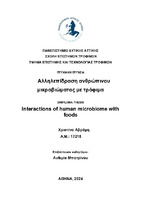| dc.contributor.advisor | Batrinou, Anthimia | |
| dc.contributor.author | Αβράμη, Χριστίνα | |
| dc.date.accessioned | 2024-03-04T09:06:07Z | |
| dc.date.available | 2024-03-04T09:06:07Z | |
| dc.date.issued | 2024-02 | |
| dc.identifier.uri | https://polynoe.lib.uniwa.gr/xmlui/handle/11400/5985 | |
| dc.identifier.uri | http://dx.doi.org/10.26265/polynoe-5821 | |
| dc.description.abstract | Θέμα της παρούσας πτυχιακής εργασίας είναι η αλληλεπίδραση του ανθρώπινου
μικροβιώματος με τα τρόφιμα. Το ανθρώπινο μικροβίωμα και, κυρίως, ο
γαστρεντερικός σωλήνας του ανθρώπου, φιλοξενεί ένα σύνολο μικροοργανισμών,
ποικίλης σύνθεσης και ποσότητας. Οι μικροοργανισμοί αυτοί επιδρούν στην
ανθρώπινη υγεία, άλλοτε θετικά και άλλοτε αρνητικά. Σκοπός, λοιπόν αυτής της
μελέτης, είναι να εξετάσει πως η κατανάλωση ορισμένων τροφίμων μπορεί να
αλληλεπιδράσει με τη μικροχλωρίδα του εντέρου. Ως αντικείμενο μελέτης επιλέχθηκε
ένα φυτικό εκχύλισμα (ιβίσκος, γαρίφαλο και τσάι του βουνού), το οποίο είναι πλούσιο
σε βιοδραστικές ενώσεις και το οποίο ήταν εμπλουτισμένο με προβιοτικά.
Δημιουργήθηκε συνθετικό γαστρικό και εντερικό υγρό στο οποίο προστέθηκε το
εμπλουτισμένο με προβιοτικά φυτικό εκχύλισμα και το οποίο επέτρεψε την
προσομοίωση της διαδικασίας πέψης σε περιβάλλον εργαστηρίου. Η διαδικασία
προσομοίωσης αποτελούνταν από 5 φάσεις (αρχική, γαστρική, εντερική, πρώιμη
εντερική ζύμωση και όψιμη εντερική ζύμωση), όπου στην τέταρτη φάση προστέθηκαν
ανθρώπινα κόπρανα υγιούς ατόμου και ατόμου που έπασχε από νόσο Crown.
Εξετάστηκε το φαινολικό περιεχόμενο δειγμάτων των 5 φάσεων με τη βοήθεια του
αντιδραστηρίου Folin-Ciocalteu, καθώς και το μικροβίωμα του υγιούς και πάσχοντος
ατόμου στο συνθετικό υπόστρωμα στις διάφορες φάσεις πέψης. | el |
| dc.format.extent | 81 | el |
| dc.language.iso | el | el |
| dc.publisher | Πανεπιστήμιο Δυτικής Αττικής | el |
| dc.rights | Αναφορά Δημιουργού - Μη Εμπορική Χρήση - Παρόμοια Διανομή 4.0 Διεθνές | * |
| dc.rights | Attribution-NonCommercial-NoDerivatives 4.0 Διεθνές | * |
| dc.rights.uri | http://creativecommons.org/licenses/by-nc-nd/4.0/ | * |
| dc.subject | Ανθρώπινο μικροβίωμα | el |
| dc.subject | Φυτικό εκχύλισμα | el |
| dc.subject | Προβιοτικά | el |
| dc.subject | FolinCiocalteu | el |
| dc.subject | Καλλιέργεια μικροοργανισμών | el |
| dc.title | Αλληλεπίδραση ανθρώπινου μικροβιώματος με τρόφιμα | el |
| dc.title.alternative | Interactions of human microbiome with foods | el |
| dc.type | Πτυχιακή εργασία | el |
| dc.contributor.committee | Στρατή, Ειρήνη | |
| dc.contributor.committee | Κοντελές, Σπυρίδων | |
| dc.contributor.faculty | Σχολή Επιστημών Τροφίμων | el |
| dc.contributor.department | Τμήμα Επιστήμης και Τεχνολογίας Τροφίμων | el |
| dc.description.abstracttranslated | The subject of this thesis is the interaction of the human microbiome with food.
The human microbiome and, above all, the human gastrointestinal tract, hosts a set
of microorganisms of varying composition and quantity. These microorganisms affect
human health, sometimes positively and sometimes negatively. Therefore, the
purpose of this study is to examine how the consumption of certain foods can interact
with the intestinal microflora. A plant extract (hibiscus, clove and mountain tea), which
is rich in bioactive compounds and which was enriched with probiotics, was chosen as
the object of study. Synthetic gastric and intestinal fluid was created to which the
probiotic-enriched plant extract was added and which allowed the digestion process
to be simulated in a laboratory environment. The simulation process consisted of 5
phases (initial, gastric, enteric, early enteric fermentation and late enteric
fermentation), where in the fourth phase, human feces of a healthy individual and an
individual suffering from Crown disease were added. The phenolic content of samples
of the 5 phases was examined using the Folin-Ciocalteu reagent, as well as the
microbiome of the healthy and diseased individual in the synthetic substrate at the
different digestion phases. | el |


